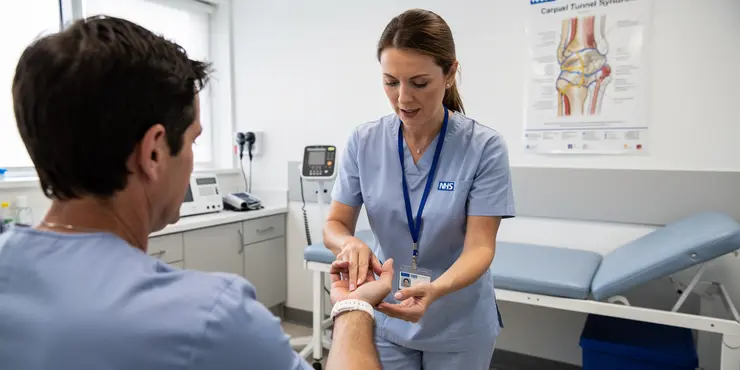
Find Help
More Items From Ergsy search
-
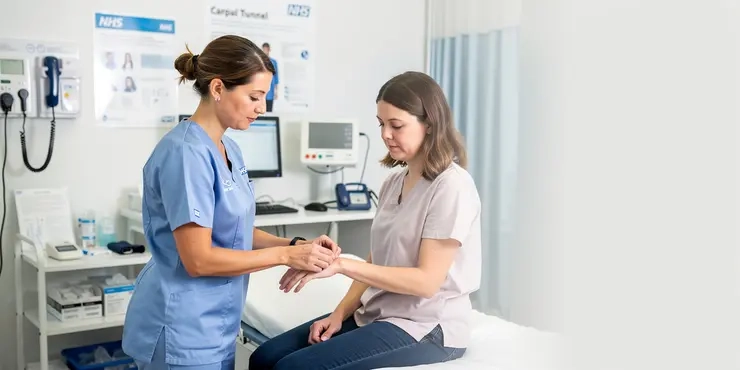
Carpal Tunnel Syndrome
Relevance: 100%
-
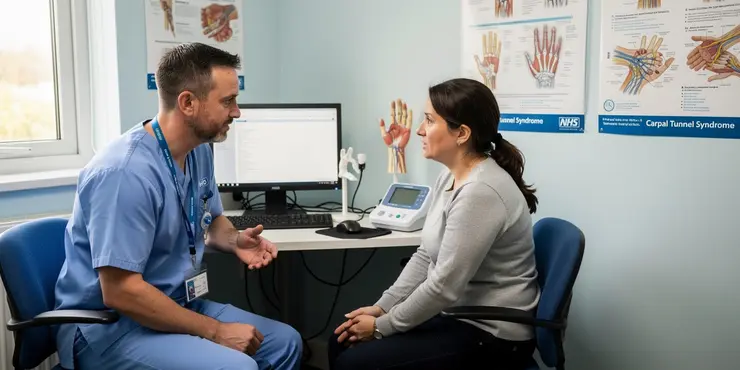
What causes Carpal Tunnel Syndrome?
Relevance: 95%
-
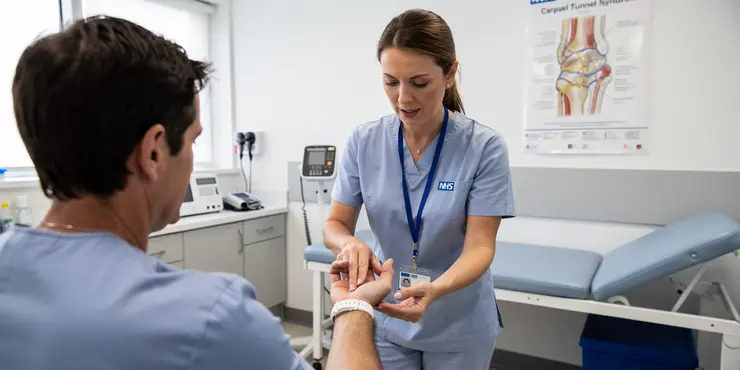
Is Carpal Tunnel Syndrome covered by the NHS?
Relevance: 94%
-
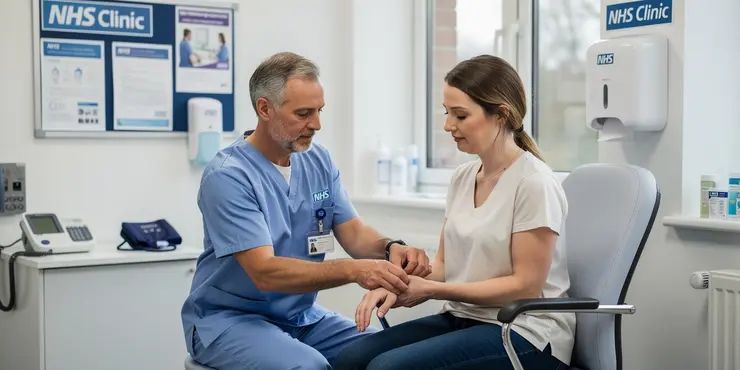
How is Carpal Tunnel Syndrome diagnosed?
Relevance: 93%
-

What is Carpal Tunnel Syndrome (CTS)?
Relevance: 92%
-
How can I prevent Carpal Tunnel Syndrome?
Relevance: 90%
-
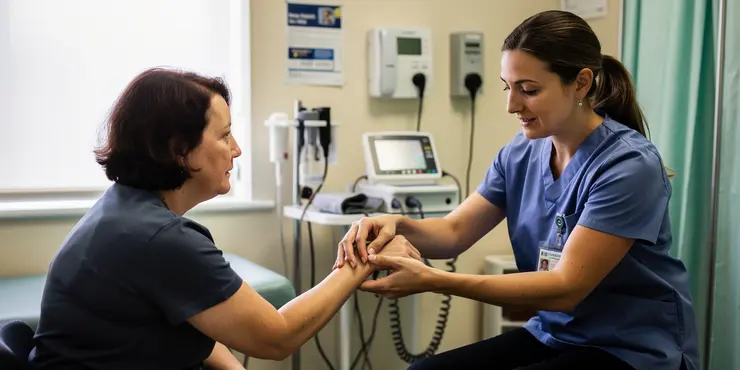
Are there any alternative treatments for Carpal Tunnel Syndrome?
Relevance: 87%
-
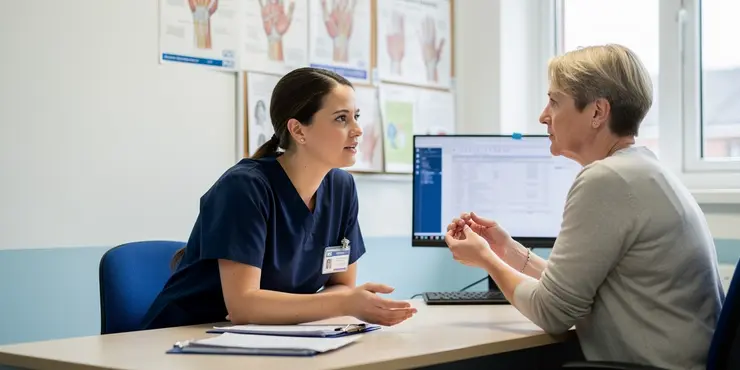
Can Carpal Tunnel Syndrome recur after treatment?
Relevance: 86%
-
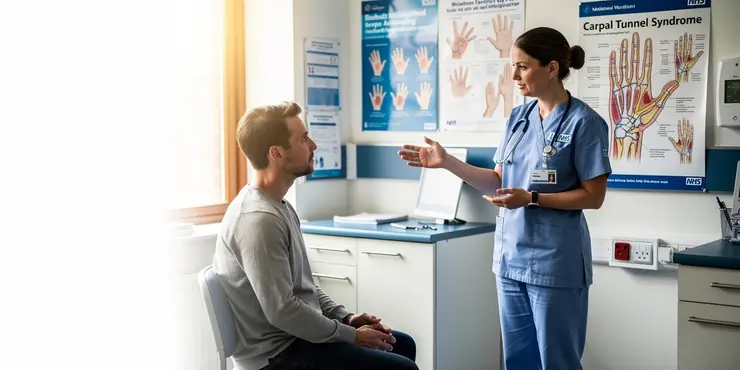
When should I consider surgery for Carpal Tunnel Syndrome?
Relevance: 86%
-
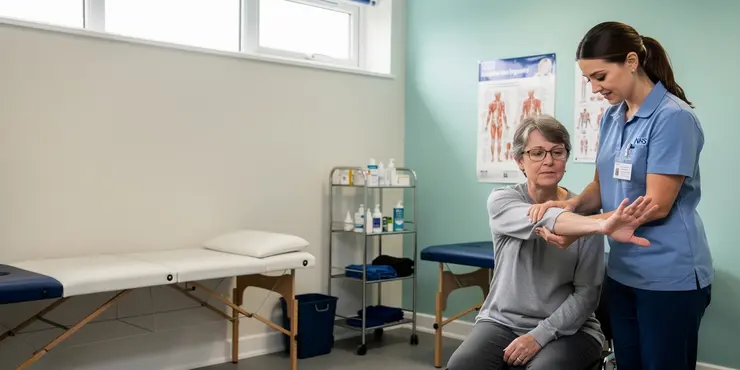
Are there specific exercises that can help with Carpal Tunnel Syndrome?
Relevance: 86%
-
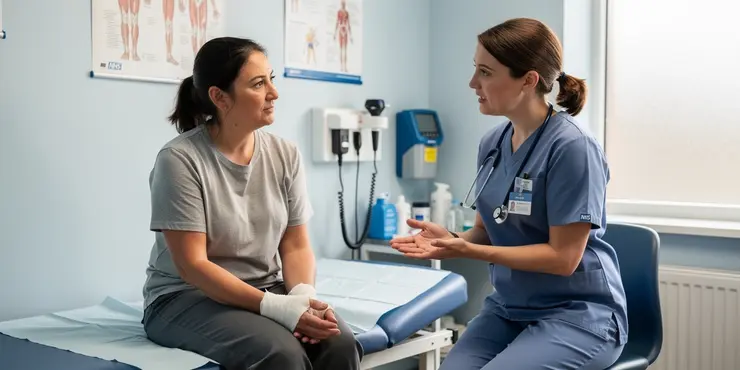
What does Carpal Tunnel Syndrome surgery involve?
Relevance: 86%
-

What non-surgical treatments are available for Carpal Tunnel Syndrome?
Relevance: 84%
-
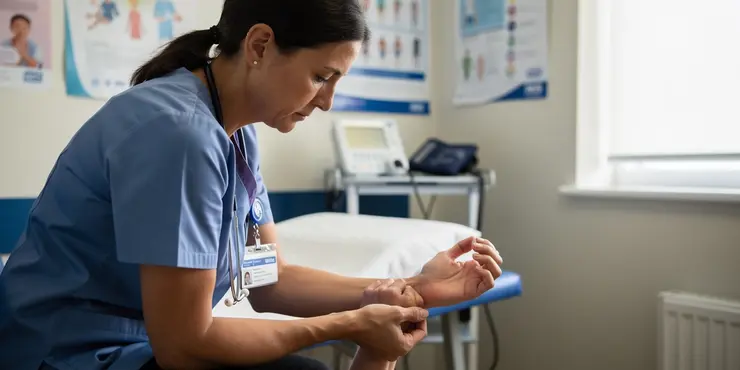
What are the common symptoms of Carpal Tunnel Syndrome?
Relevance: 79%
-

Can lifestyle changes help manage Carpal Tunnel Syndrome?
Relevance: 77%
-

Can I work or continue sports activities if I have Carpal Tunnel Syndrome?
Relevance: 77%
-
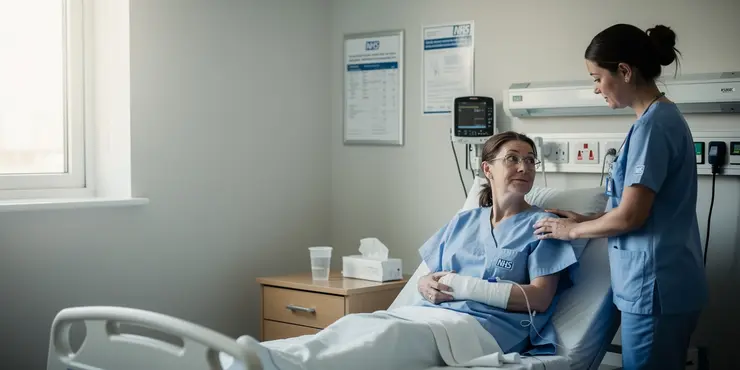
What is the recovery time after Carpal Tunnel Surgery?
Relevance: 64%
-
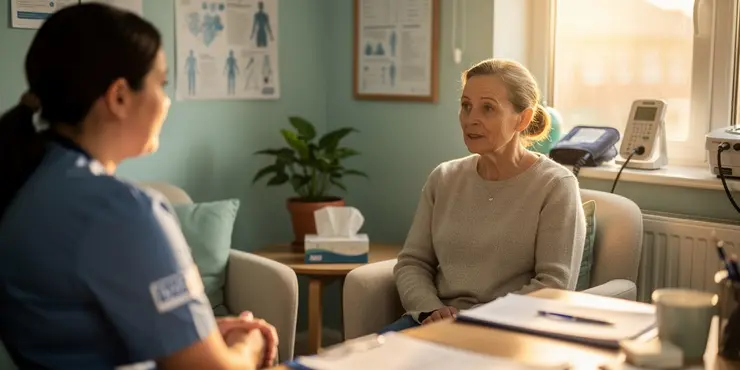
What is Cushing's syndrome?
Relevance: 26%
-

Munchausen's syndrome | NHS
Relevance: 26%
-
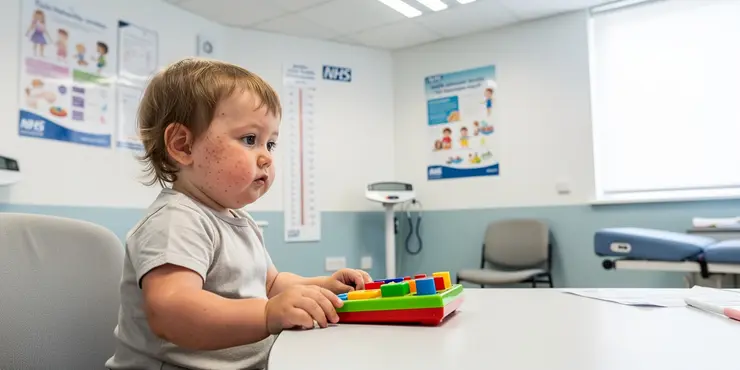
Prader-Willi Syndrome | NHS
Relevance: 26%
-

Is chronic fatigue syndrome contagious?
Relevance: 24%
-

Turner syndrome: Beyond the classic XO phenotype
Relevance: 24%
-
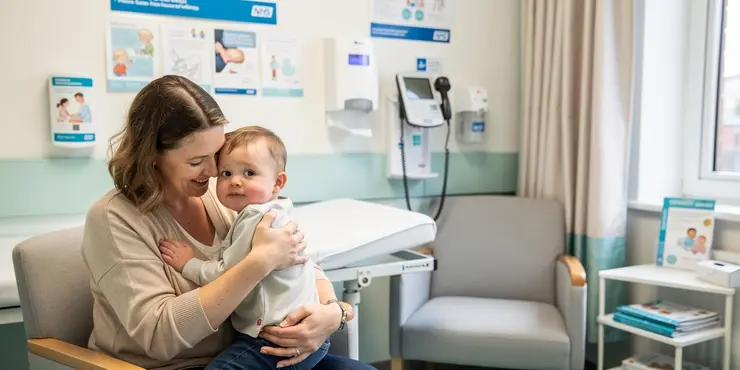
Having a child with Down's syndrome | NHS
Relevance: 24%
-

Down's syndrome: Emily's story | NHS
Relevance: 24%
-
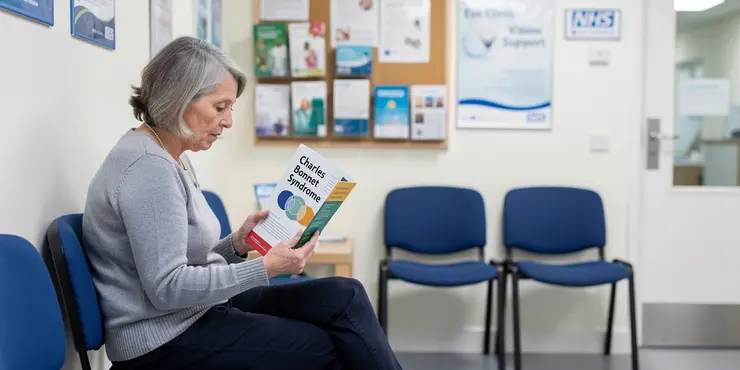
Charles Bonnet Syndrome
Relevance: 24%
-

What causes chronic fatigue syndrome?
Relevance: 24%
-
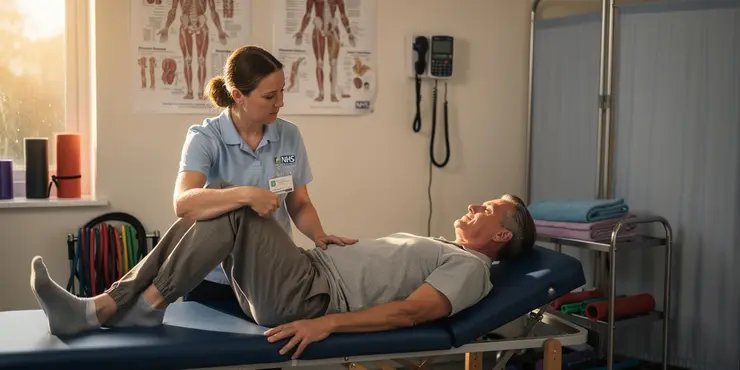
Exercises for sciatica: piriformis syndrome | NHS
Relevance: 23%
-

What is complex sleep apnea syndrome?
Relevance: 23%
-
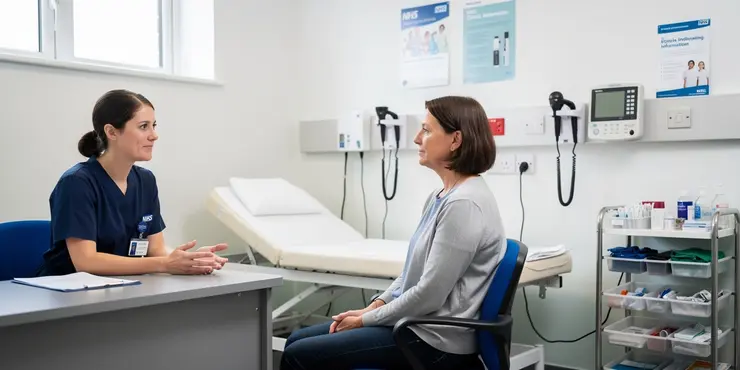
What is complex sleep apnea syndrome?
Relevance: 23%
-
What is chronic fatigue syndrome?
Relevance: 23%
-

What is congenital rubella syndrome?
Relevance: 23%
-

Having a child with Edwards' syndrome (trisomy 18) | NHS
Relevance: 22%
-

What is the difference between autism and Asperger's syndrome?
Relevance: 22%
-
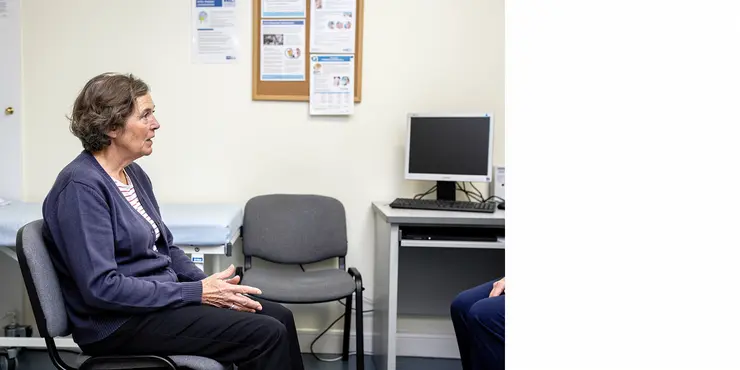
Are there psychological aspects to chronic fatigue syndrome?
Relevance: 22%
-
Is chronic fatigue syndrome a mental illness?
Relevance: 21%
-

Greater trochanteric pain syndrome
Relevance: 21%
-

Building Understanding and Supporting Your Child with Tourette’s Syndrome/Tics
Relevance: 21%
-
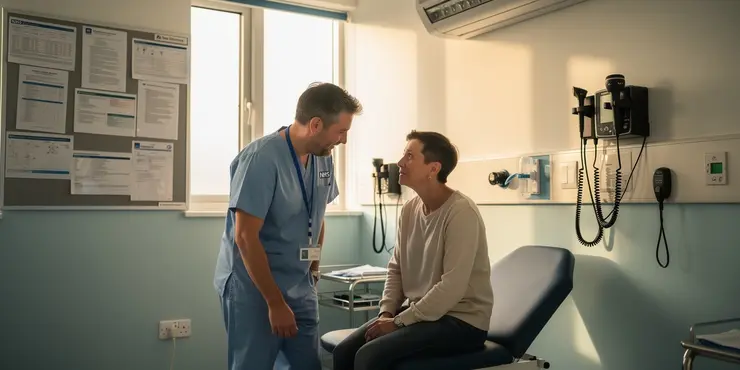
What role do infections play in chronic fatigue syndrome?
Relevance: 21%
-
Can baby sleep pillows prevent flat head syndrome?
Relevance: 21%
-

Who is at risk of developing chronic fatigue syndrome?
Relevance: 21%
-

What is irritable bowel syndrome (IBS)?
Relevance: 20%
Understanding Carpal Tunnel Syndrome
Carpal Tunnel Syndrome (CTS) is a common condition that affects a significant number of people in the UK. It occurs when the median nerve, which runs from the forearm into the palm of the hand, becomes pressed or squeezed at the wrist. This can lead to symptoms such as numbness, tingling, and weakness in the hand and arm. It is particularly prevalent among individuals whose work involves repetitive hand movements or certain positions of the wrist.
Diagnosis and Treatment Options
Individuals experiencing symptoms of Carpal Tunnel Syndrome are encouraged to consult with a healthcare professional for a proper diagnosis. The NHS provides a comprehensive range of services for diagnosing CTS. This usually involves a physical examination and may include tests such as nerve conduction studies to confirm the diagnosis.
Once diagnosed, initial treatment for CTS often includes non-surgical methods such as wrist splinting, especially at night, to keep the wrist in a neutral position. Additionally, the NHS may recommend lifestyle changes or medications to reduce inflammation. In cases where these treatments are ineffective, or if the condition is severe, surgical intervention might be considered.
National Health Service (NHS) Coverage
The National Health Service (NHS) in the UK typically covers the cost of diagnosing and treating Carpal Tunnel Syndrome. This means that both consultations with healthcare professionals and recommended treatments are usually funded by the NHS, which alleviates the financial burden on patients. The process begins with visiting a GP, who can make the appropriate referrals to specialists as needed.
If non-surgical treatments are unsuccessful and surgery becomes necessary, the NHS also provides coverage for the procedure known as a carpal tunnel release. This surgery involves cutting the ligament that forms the roof of the carpal tunnel, thereby reducing pressure on the median nerve. It can be performed as an open surgery or as an endoscopic procedure, both of which are covered under the NHS.
Accessing NHS Services
Patients seeking NHS services for Carpal Tunnel Syndrome should first contact their GP, who will assess their symptoms and may refer them to a specialist if necessary. The NHS aims to provide timely treatment, although waiting times for non-urgent surgery can vary depending on demand and resource availability in different areas.
Beyond the immediate treatment, the NHS also offers post-operative care and guidance to support recovery and rehabilitation. Patients are usually given exercises to perform at home to regain strength and mobility in the affected hand and wrist.
Overall, the NHS plays a crucial role in managing and treating Carpal Tunnel Syndrome. By providing comprehensive coverage and support, the NHS ensures that UK residents have access to necessary healthcare services without undue financial strain.
Understanding Carpal Tunnel Syndrome
Carpal Tunnel Syndrome (CTS) is a problem that many people in the UK have. It happens when a nerve in the wrist gets squeezed. This nerve goes from your forearm to your hand. When it gets squeezed, you might feel numb, tingly, or weak in your hand and arm. This can happen if you do the same hand movements over and over, or if you hold your wrist in a certain way.
Diagnosis and Treatment Options
If you think you have Carpal Tunnel Syndrome, you should see a doctor. The NHS can help find out if you have it. The doctor will check your wrist and might do some tests to be sure.
To treat it, doctors usually start with things that don't involve surgery. They might give you a brace to keep your wrist straight, especially when you sleep. The NHS might also suggest changing how you use your wrist or taking medicine to help with swelling. If these don't work, or if CTS is really bad, you might need surgery.
National Health Service (NHS) Coverage
The NHS in the UK usually pays for getting checked and treated for Carpal Tunnel Syndrome. This means you don't have to pay for visits to the doctor or the treatment they suggest. You start by seeing your GP (General Practitioner), who can send you to a specialist if needed.
If you need surgery because other treatments didn’t work, the NHS covers this too. The surgery, called carpal tunnel release, helps by cutting a part of the wrist to stop squeezing the nerve. This can be done in two ways, and both are covered by the NHS.
Accessing NHS Services
To get help from the NHS for Carpal Tunnel Syndrome, you should first see your GP. They will look at your symptoms and may refer you to a specialist if needed. The NHS tries to provide treatment quickly, but sometimes you might have to wait a bit, depending on how busy they are.
After treatment or surgery, the NHS also helps you get better with advice and exercises. You may need to do some exercises at home to make your hand and wrist strong again.
The NHS is important in helping people with Carpal Tunnel Syndrome. They make sure people in the UK can get the care they need without worrying about the cost.
Frequently Asked Questions
What is Carpal Tunnel Syndrome?
Carpal Tunnel Syndrome (CTS) is a condition caused by pressure on the median nerve as it travels through the carpal tunnel in the wrist, leading to symptoms like pain, numbness, and tingling in the hand and arm.
Is Carpal Tunnel Syndrome covered by the NHS?
Yes, Carpal Tunnel Syndrome is typically covered by the NHS. They provide diagnosis and treatments including non-surgical and surgical options depending on the severity of the condition.
What treatments for Carpal Tunnel Syndrome does the NHS offer?
The NHS offers a range of treatments for Carpal Tunnel Syndrome including wrist splints, corticosteroid injections, and in some cases, surgery to relieve pressure on the median nerve.
Do I need a referral to get treatment for Carpal Tunnel Syndrome on the NHS?
Yes, you typically need a referral from your GP to see a specialist for Carpal Tunnel Syndrome treatment on the NHS.
How does the NHS diagnose Carpal Tunnel Syndrome?
The NHS diagnoses Carpal Tunnel Syndrome based on your symptoms, medical history, and tests such as nerve conduction studies or ultrasound.
Can I get Carpal Tunnel surgery on the NHS?
Yes, if non-surgical treatments are not effective, the NHS can offer surgery to help relieve Carpal Tunnel Syndrome.
Are there any costs for Carpal Tunnel treatment on the NHS?
Treatment for Carpal Tunnel Syndrome on the NHS is generally free at the point of use for residents with NHS coverage.
How long is the waiting list for Carpal Tunnel treatment on the NHS?
Waiting times for Carpal Tunnel treatment can vary depending on the urgency of your condition and local NHS resources.
What factors determine if I need surgery for Carpal Tunnel Syndrome?
Surgery may be recommended if you have severe symptoms, nerve damage, or if non-surgical treatments have failed to relieve symptoms.
Is Carpal Tunnel Syndrome considered a serious condition by the NHS?
Carpal Tunnel Syndrome is not usually considered serious, but severe cases can cause pain and disability, requiring medical treatment.
Can I choose my hospital or surgeon for Carpal Tunnel treatment on the NHS?
You may be able to choose your hospital and, in some cases, your surgeon within the NHS guidelines.
Will the NHS cover follow-up care after Carpal Tunnel surgery?
Yes, the NHS covers necessary follow-up care after Carpal Tunnel surgery.
Can I get a second opinion for my Carpal Tunnel Syndrome treatment on the NHS?
Yes, you can request a second opinion for your condition or treatment options on the NHS.
Are there lifestyle changes recommended by the NHS for managing Carpal Tunnel Syndrome?
Yes, the NHS may recommend lifestyle changes such as taking regular breaks, exercises, and using ergonomic tools to help manage symptoms.
How effective is surgery for Carpal Tunnel Syndrome?
Surgery for Carpal Tunnel Syndrome is generally effective, with most patients experiencing significant relief of symptoms.
What are the risks of Carpal Tunnel surgery covered by the NHS?
As with any surgery, there are risks such as infection, stiffness, and nerve damage, though these are generally low for Carpal Tunnel surgery.
How can I reduce my wait time for Carpal Tunnel treatment on the NHS?
You can ask your GP for advice on reducing wait times, which might include considering different NHS Trusts with shorter waiting lists.
Will my GP prescribe medication for Carpal Tunnel Syndrome before referring me?
Your GP might prescribe anti-inflammatory painkillers or suggest over-the-counter options as an initial treatment before referring you for specialist care.
Is Carpal Tunnel Syndrome more common in certain groups?
Yes, it is more common in women, those with certain medical conditions, and people who perform repetitive hand and wrist activities.
Can the NHS provide wrist supports for Carpal Tunnel Syndrome?
Yes, the NHS may provide or recommend wrist supports or splints as part of the initial treatment for Carpal Tunnel Syndrome.
What is Carpal Tunnel Syndrome?
Carpal Tunnel Syndrome is when your hand feels tingly or hurts because a nerve in your wrist is squeezed.
This can affect how your fingers move.
Ask a doctor if your hand feels bad for a long time.
You can use a tool like a wrist splint to help.
Carpal Tunnel Syndrome (CTS) happens when there is pressure on a nerve in your wrist. This can cause pain, numbness, and tingling in your hand and arm.
Using a soft keyboard or mouse pad can help.
Taking breaks from typing or using your wrist too much can help too.
Can the NHS help with Carpal Tunnel Syndrome?
Do you have wrist pain called Carpal Tunnel Syndrome?
The NHS can help you. You can ask your doctor for help.
Using tools like a wrist brace can help your wrist feel better.
Yes, the NHS can help with Carpal Tunnel Syndrome. They can find out if you have it and give you treatments. These treatments can be surgeries or other options, depending on how bad it is.
If you need help reading, you can try asking someone to read it with you or use a reading app to read it out loud.
What help does the NHS give for Carpal Tunnel?
The NHS can help if your wrist and hand hurt because of Carpal Tunnel. They have different ways to make it better. Here are some things they might do:
- Wrist Splints: You can wear a special band on your wrist at night. It helps keep your wrist straight while you sleep.
- Exercises: The doctor might show you easy exercises to make your hand and wrist feel better.
- Medicines: Sometimes, they give medicine to help with the pain and swelling.
- Injections: A doctor might give you a small injection in your wrist to help with pain.
- Surgery: If nothing else works, a doctor can do a small surgery to make your wrist better.
Ask your doctor for help. They will know which way is best for you.
The NHS can help if you have Carpal Tunnel Syndrome. They can give you wrist splints to wear. Sometimes, they might give you injections to help. If it’s really bad, doctors might do a little operation to make you feel better. These treatments help by taking the pressure off your hand nerve.
Do I need a letter from my doctor to get help for Carpal Tunnel Syndrome on the NHS?
Carpal Tunnel Syndrome can make your wrist and hand hurt or feel weak.
If you want help from the NHS, you might need a letter from your doctor. This is called a "referral".
Here are some tips to help:
- Ask your doctor if you need a referral.
- Try to explain how your symptoms feel.
- Write down any questions before you see the doctor.
Yes, you need to see your main doctor, called a GP, to get a note. This note lets you see a special doctor for Carpal Tunnel Syndrome treatment on the NHS.
How does the NHS find out if you have Carpal Tunnel Syndrome?
The NHS has a way to see if your hand problem is Carpal Tunnel Syndrome. Doctors use tests and ask questions. Here is how it works:
- Doctor's Questions: The doctor will ask you how your hand feels. Does it tingle or hurt? Do your fingers feel numb?
- Tests: The doctor might do tests. They might use a special tool to check how well your nerves work.
- Specialist Help: Sometimes, you might see a hand specialist to help diagnose the problem.
Here are some tools that can help you:
- Pictures: Look at pictures that show Carpal Tunnel Syndrome.
- Apps: Use apps that explain health problems with pictures and sounds.
The NHS figures out if you have Carpal Tunnel Syndrome by looking at your symptoms, asking about your medical history, and doing tests like checking how well your nerves work or using an ultrasound.
Can I have Carpal Tunnel surgery with the NHS?
Yes, you can get Carpal Tunnel surgery with the NHS.
Carpal Tunnel syndrome hurts your hand or wrist. A doctor can help make it better.
If you think you have Carpal Tunnel, visit your doctor. They will tell you what to do next.
Tip: You can use tools like screen readers if reading is hard for you. These tools can read the words out loud.
Yes, if other treatments do not work, the NHS can give you an operation to help with Carpal Tunnel Syndrome.
Do you have to pay for Carpal Tunnel help on the NHS?
If you have Carpal Tunnel, you might need help from the NHS. The NHS is a service that helps people when they are sick or in pain.
Most of the time, you do not have to pay when you get help from the NHS. But sometimes, there might be small costs, like for medicine or special things you need.
It is a good idea to talk to a doctor or nurse. They can tell you if you need to pay for anything. Also, someone at the hospital or clinic can help explain what you need to know.
If you live in the UK and have NHS health care, getting help for Carpal Tunnel Syndrome usually costs no money when you need it.
How long do you have to wait for Carpal Tunnel help on the NHS?
How long you wait for Carpal Tunnel treatment can be different. It depends on how bad your problem is and what doctors are nearby to help.
How do doctors decide if I need surgery for Carpal Tunnel Syndrome?
Here are some things doctors look at:
- How bad your wrist and hand hurt
- If your fingers feel numb or tingly
- How hard it is to do things with your hand
- If other treatments like wrist splints or exercises worked
Ask your doctor to explain things in a simple way. You can also use pictures or videos to help understand.
You might need surgery if you have really bad symptoms, if your nerves are hurt, or if other treatments didn't help you feel better.
Does the NHS say Carpal Tunnel Syndrome is serious?
Carpal Tunnel Syndrome can make your hand hurt, tingle, or feel weak. The NHS does help people with it. You might need help to stop it from getting worse. Try using wrist splints or doing hand exercises. Visit a doctor if you are worried.
Carpal Tunnel Syndrome is usually not very serious. But when it gets really bad, it can hurt and make it hard to do things. When this happens, you might need to see a doctor.
Some ways to help with Carpal Tunnel Syndrome are using a wrist brace, taking rest breaks, and doing special exercises. These can make your wrist feel better.
Can I pick my hospital or doctor for Carpal Tunnel care on the NHS?
Yes, you can usually choose your hospital or doctor for Carpal Tunnel care on the NHS.
Here's how:
- Talk to your family doctor. They can help you choose.
- Look online for hospitals or doctors who treat Carpal Tunnel.
Tools that can help:
- Ask someone you trust to help you read information.
- Watch videos about Carpal Tunnel to learn more.
You can pick your hospital. Sometimes, you can pick your doctor too. Follow NHS rules to do this.
Will the NHS pay for care after Carpal Tunnel surgery?
The NHS might help with care after surgery. Ask your doctor or nurse for more information. They can tell you what help is available.
If you have questions, ask someone. You can use pictures or write things down to help you understand.
Yes, the NHS will help you after your Carpal Tunnel surgery if you need more care.
Can I ask another doctor about my Carpal Tunnel help from the NHS?
Yes, you can ask another doctor to look at your health problem or treatment choices on the NHS.
Can the NHS suggest changes in daily habits to help with Carpal Tunnel Syndrome?
Yes, the NHS might say to change some things in your life. This can include taking breaks, doing exercises, and using special tools that help how you sit and work.
How well does surgery fix Carpal Tunnel Syndrome?
Surgery can help make the pain from Carpal Tunnel Syndrome go away. It can also make your hand feel better and stronger.
Here are some things that might help you understand better:
- Draw a picture of the hand and wrist to see where the problem is.
- Watch a video showing how surgery can help.
- Ask someone to explain it using simple words.
Surgery for Carpal Tunnel Syndrome usually works well. Most people feel much better and have fewer symptoms after the surgery.
What are the dangers of Carpal Tunnel surgery on the NHS?
Carpal Tunnel surgery is an operation on your wrist.
There are some dangers you need to know about:
- You might feel pain in your hand.
- Your hand can feel weak.
- Your hand might feel a bit different or numb.
- Sometimes, the surgery might not fix the problem.
- You could have a scar on your skin.
- There is a small chance of infection.
If you have questions or are worried, talk to your doctor or nurse. They can help you understand.
You can also use pictures or videos to learn more. These can make it easier to understand.
When you have surgery, some things can go wrong. You might get an infection, your hand might feel stiff, or you could have nerve problems. But don't worry, these problems don't happen very often with Carpal Tunnel surgery.
If you find reading hard, there are things that can help. You can use tools like audiobooks or ask someone to read with you. Taking breaks while reading and using a finger or a pen to point at words can also make reading easier.
How can I get help for my Carpal Tunnel faster on the NHS?
You can talk to your GP (doctor) for help with waiting times. They might suggest going to another hospital with a shorter wait.
Can my doctor give me medicine for Carpal Tunnel Syndrome before sending me to a specialist?
If you have Carpal Tunnel Syndrome, your wrist might hurt or feel numb.
Talk to your doctor. They might give you medicine to help with the pain.
Your doctor may also send you to a specialist for more help.
When you visit your doctor, you can ask:
- "Can you give me medicine to help with my wrist pain?"
- "Do I need to see a specialist?"
Bring a friend or family member to help understand what the doctor says.
Your doctor might give you medicine to help with pain and swelling. They might also suggest you try some medicine you can buy at the store. This is to help you feel better before sending you to a special doctor.
Do some people get Carpal Tunnel Syndrome more often?
Carpal Tunnel Syndrome is when your wrist hurts because a nerve is squeezed. Some people get it more than others.
Here are some groups that get it more often:
- People who use their hands a lot: If you type, write, or use tools a lot, you might get it.
- Older people: As you get older, your chance of getting it goes up.
- Women: Women are more likely to get it than men.
- People with certain health problems: If you have diabetes or arthritis, you might get it more.
If your wrist hurts, talk to a doctor. Using a wrist support or taking breaks can help.
Yes, this happens more often to women. It also happens to people with some health problems and to people who use their hands and wrists a lot for the same actions.
Can the NHS give wrist supports for Carpal Tunnel Syndrome?
Yes, the NHS can give you or suggest wrist supports or splints to help when you first have Carpal Tunnel Syndrome.
Useful Links
This website offers general information and is not a substitute for professional advice.
Always seek guidance from qualified professionals.
If you have any medical concerns or need urgent help, contact a healthcare professional or emergency services immediately.
Some of this content was generated with AI assistance. We’ve done our best to keep it accurate, helpful, and human-friendly.
- Ergsy carfully checks the information in the videos we provide here.
- Videos shown by Youtube after a video has completed, have NOT been reviewed by ERGSY.
- To view, click the arrow in centre of video.
- Most of the videos you find here will have subtitles and/or closed captions available.
- You may need to turn these on, and choose your preferred language.
- Go to the video you'd like to watch.
- If closed captions (CC) are available, settings will be visible on the bottom right of the video player.
- To turn on Captions, click settings .
- To turn off Captions, click settings again.
More Items From Ergsy search
-

Carpal Tunnel Syndrome
Relevance: 100%
-

What causes Carpal Tunnel Syndrome?
Relevance: 95%
-

Is Carpal Tunnel Syndrome covered by the NHS?
Relevance: 94%
-

How is Carpal Tunnel Syndrome diagnosed?
Relevance: 93%
-

What is Carpal Tunnel Syndrome (CTS)?
Relevance: 92%
-
How can I prevent Carpal Tunnel Syndrome?
Relevance: 90%
-

Are there any alternative treatments for Carpal Tunnel Syndrome?
Relevance: 87%
-

Can Carpal Tunnel Syndrome recur after treatment?
Relevance: 86%
-

When should I consider surgery for Carpal Tunnel Syndrome?
Relevance: 86%
-

Are there specific exercises that can help with Carpal Tunnel Syndrome?
Relevance: 86%
-

What does Carpal Tunnel Syndrome surgery involve?
Relevance: 86%
-

What non-surgical treatments are available for Carpal Tunnel Syndrome?
Relevance: 84%
-

What are the common symptoms of Carpal Tunnel Syndrome?
Relevance: 79%
-

Can lifestyle changes help manage Carpal Tunnel Syndrome?
Relevance: 77%
-

Can I work or continue sports activities if I have Carpal Tunnel Syndrome?
Relevance: 77%
-

What is the recovery time after Carpal Tunnel Surgery?
Relevance: 64%
-

What is Cushing's syndrome?
Relevance: 26%
-

Munchausen's syndrome | NHS
Relevance: 26%
-

Prader-Willi Syndrome | NHS
Relevance: 26%
-

Is chronic fatigue syndrome contagious?
Relevance: 24%
-

Turner syndrome: Beyond the classic XO phenotype
Relevance: 24%
-

Having a child with Down's syndrome | NHS
Relevance: 24%
-

Down's syndrome: Emily's story | NHS
Relevance: 24%
-

Charles Bonnet Syndrome
Relevance: 24%
-

What causes chronic fatigue syndrome?
Relevance: 24%
-

Exercises for sciatica: piriformis syndrome | NHS
Relevance: 23%
-

What is complex sleep apnea syndrome?
Relevance: 23%
-

What is complex sleep apnea syndrome?
Relevance: 23%
-
What is chronic fatigue syndrome?
Relevance: 23%
-

What is congenital rubella syndrome?
Relevance: 23%
-

Having a child with Edwards' syndrome (trisomy 18) | NHS
Relevance: 22%
-

What is the difference between autism and Asperger's syndrome?
Relevance: 22%
-

Are there psychological aspects to chronic fatigue syndrome?
Relevance: 22%
-
Is chronic fatigue syndrome a mental illness?
Relevance: 21%
-

Greater trochanteric pain syndrome
Relevance: 21%
-

Building Understanding and Supporting Your Child with Tourette’s Syndrome/Tics
Relevance: 21%
-

What role do infections play in chronic fatigue syndrome?
Relevance: 21%
-
Can baby sleep pillows prevent flat head syndrome?
Relevance: 21%
-

Who is at risk of developing chronic fatigue syndrome?
Relevance: 21%
-

What is irritable bowel syndrome (IBS)?
Relevance: 20%


